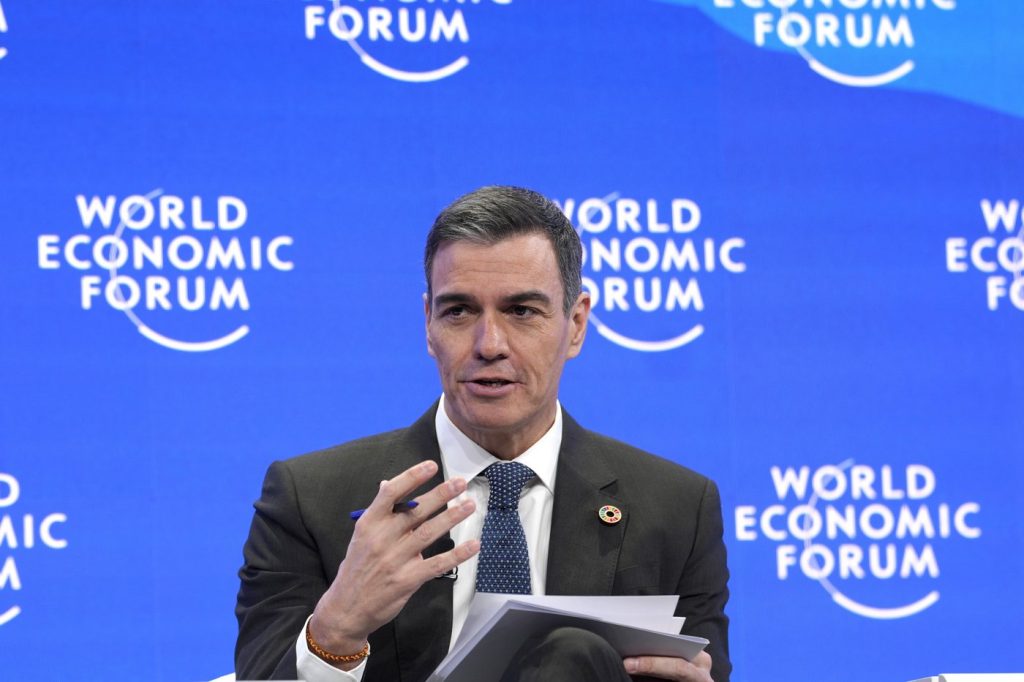DAVOS, Switzerland — Spanish Prime Minister Pedro Sánchez has initiated a campaign to address the perceived negative impacts of social media on society. Speaking at the World Economic Forum held in Davos, he championed stronger regulations by the European Union (EU) to enhance user accountability and transparency across social media platforms, particularly targeting Elon Musk's X, TikTok, and Meta's Facebook and Instagram.
Sánchez described social media as a "common resource for humanity," akin to the oceans, emphasizing the need for their protection and management. He asserts that these platforms endanger participatory democracy and the mental well-being of users, urging EU leaders to take significant measures to "make social media great again." His three-point plan outlines a comprehensive approach to tackling these issues.
Step 1: End User Anonymity
The first step includes the proposal for legislation aimed at abolishing anonymity for social media users. When discussing this proposal, Sánchez stated that he would present this idea during the EU’s leaders' meeting in Brussels on March 20-21. His plan would require each social media username to be linked to a real identity through a "European digital identity wallet." This system would enable citizens to use nicknames, but crucially, it would allow authorities to trace these nicknames back to real individuals in cases of criminal activity.
Sánchez argued that allowing anonymity facilitates misinformation, hate speech, and cyber harassment, as it enables individuals to act without accountability. The move, however, has drawn criticism from digital rights groups who warn that removing online anonymity threatens freedom of speech and could have a chilling effect on public discourse.
Step 2: More Transparency for Algorithms
The second step of Sánchez's plan focuses on enhancing transparency regarding social media algorithms. He aims to compel EU officials to enforce the Digital Services Act enacted in 2023, which seeks to safeguard internet users. This legislation would require social media companies to open the "black box" of their algorithms for inspection and reinforce the European Centre for Algorithm Transparency to monitor these systems effectively.
While companies may resist such regulatory scrutiny citing intellectual property concerns, there have been ongoing investigations into algorithm usage by authorities, highlighting a push for greater accountability in this sphere. Recent orders from EU officials directed X to provide detailed information as part of an ongoing investigation into its algorithmic practices.
Step 3: Hold Tech CEOs Responsible
The third component of Sánchez's strategy calls for holding the CEOs of tech companies accountable for any societal issues stemming from their platforms. He proposes that these leaders be liable for non-compliance with laws related to their services, likening this responsibility to that faced by traditional business owners. This concept mirrors similar accountability measures introduced in the UK, where senior managers can face criminal liability under certain conditions.
Sánchez's initiative reflects the broader global concern regarding the effects of social media, particularly on children and teenagers. Spain's government has already implemented restrictions on mobile phone use in schools and raised alarms about the increasing exposure of youth to online pornography.
Addressing the influence of social media owners on politics, Sánchez criticized tech billionaires like Musk for seeking political power that could undermine democratic institutions. He emphasized that these individuals, having accumulated significant economic power, are now attempting to extend their reach into political domains.
In reaction to Sánchez's proposals, Argentine President Javier Milei, also attending the Davos gathering, criticized the suggestions, presenting them as attempts by the socialist government to silence dissenting opinions.
Through this multi-faceted approach, Sánchez seeks not only to regulate social media more strictly but to ensure that technological giants are held accountable for the impact of their platforms on society.










